What it takes to become a FIDE Arbiter
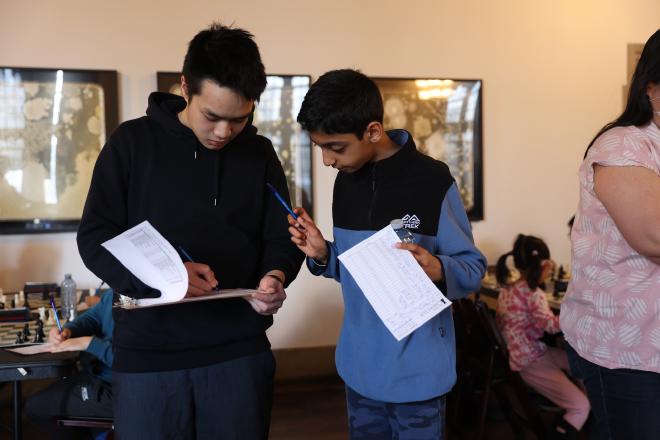
Table of Contents
I’m now a FIDE Arbiter! This is an official international title from FIDE (International Chess Federation) in the arbiter world of chess. It’s the same as how FIFA for football delegates referee titles. Here I’ve listed out what I’ve learned about the process of arbitrating and how people can get involved.
What is a FIDE Arbiter #
According to Wikipedia, an arbiter is
an official who oversees matches and ensures that the rules of chess are followed
That description is just a small summary of the FIDE Arbiters Manual, which is the official textbook for chess arbitrating. The 2025 version is available here.
On paper, there are essentially only 2 items that all Arbiters need to submit to FIDE for them to approve your application:
- at least 3 “norms” each from a different event (experience metric)
- attendance at a FIDE Arbiters Seminar and passing the exam (examination/knowledge metric)
In practice, most people I know who put in the time to become an FIDE Arbiter will be able to achieve it in about 2 years. However, actually achieving these tasks usually comes with years of work and effort. Getting experience at tournaments requires reaching out to organizers or helping with the organization yourself. Passing the FIDE Arbiters seminar requires a seminar to be organized which you can attend and afford. Before attending the FIDE Arbiters Seminar one also needs to be a National Arbiter (certified by the federation).
In addition, just getting the arbiter title is not usually the end-goal. FIDE Arbiter is one step below the International Arbiter (IA) title which many people strive to achieve. In order to get IA you almost certainly need to be invited to tournaments and have good relationships with organizers.
Let’s first discuss what it takes to start becoming an Arbiter.
Steps to become a National Arbiter #
The first step for becoming an arbiter in Canada is to become a National Arbiter. To become one, there are similarly a set of rules and requirements. However, training for the standards of arbiters has been debated quite a bit in Canadian chess administration circles for a few years now. Also note that Fédération québécoise des échecs (FQE) has a few other rules for chess arbiters in Québec.
1. Recommendations
- 2 recommendations from IA/FAs based on tournament experience
- Seminar + test = 1 recommendation
- Provincial president’s recommendation + any NA recommendation = 1 recommendation
- Tournament experience as arbiter/player. Any FIDE rated tournament outside of Canada is counted. CMA events counted only if they are CFC rated.
- At least 10 tournaments as an arbiter/organizer
- At least 20 tournaments as an arbiter/organizer/player
- In certain cases CFC could waive 1 recommendation.
These requirements as of 2025 are in flux as many people have commented that in theory someone could become a National Arbiter in one-weekend given that they served as an arbiter for a massive tournament such as the Canadian Youth Chess Championships (with U8-U10-U12-U14-U16-U18 x2 = 12 tournaments).
There is currently a non-mandatory seminar which I definitely would support for creating a baseline for arbiters in Canada. I’ve seen the NA Seminar organized and I’ve found that people who attend learn a lot from it. After attending the seminar, they are more knowledgeable about how to arbiter and in particular the Laws of Chess.
Let’s dive deeper into what I think are fundamentals of becoming a National Arbiter
My Requirements for Becoming a National Arbiter #
Experience at Tournaments as an Arbiter #
Clearly to be credited as a National Arbiter one needs to have been to some tournaments and have been part of the arbiter team at these said tournaments. I’d suggest that they have worked with at least 2 different Chief Arbiters so that they know how different arbiters do things. This will also set themselves nicely if they would like to get references so that they can progress up the ranks of becoming an accredited arbiter. The number of tournaments doesn’t matter as much as the experience and knowledge that the arbiters have. Anyone can spend time memorizing the FIDE Arbiters Handbook but actually imparting that knowledge within a tournament is key. I generally do support having at least 10 tournaments before becoming a National Arbiter as a good baseline experience level.
Laws of Chess #
Unfortunately just getting tournament experience by being an arbiter doesn’t ensure that everyone has the same starting understanding of the laws of chess. The foundational component of being an arbiter should be that they have a greater understanding than the players of what is right and wrong in chess play. When we have new arbiters coming through Hart House’s ranks we understand that they need to gain experience but at the same time they need to read up on what the rules of chess are.
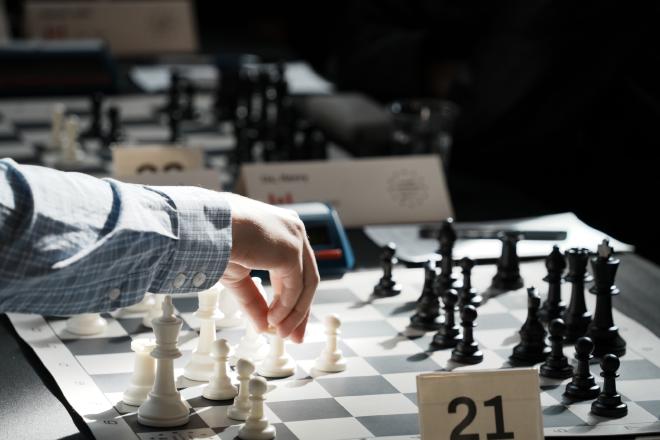 |
|---|
| Here is an example of where it’s necessary to enforce touch move. Both being there to watch the moves unfold, seeing the infraction in the law, and then applying the penalties are fundamental to being an Arbiter. (Photo by Yankee Zhu) |
Tournament Experience Playing in at least 3 tournaments #
In my opinion, any National Arbiter needs to have played chess over the board at a tournament in at least 3 tournaments. It’s hard to enforce for everyone as there could be exceptions. But in general, without playing over-the-board you don’t understand what a player is thinking of when playing chess. Players want announcements to be short. They want to have space. They want good lighting. And also they want the arbiter to be able to assess the position for 3-folds, 50-moves, quickly. One of the things that I find arbiters without tournament experience struggle with is sound. I guarantee that sound travels and arbiters without tournament experience oftentimes don’t realize that the sound coming into the room is affecting the players. One other thing that arbiters should ensure is that players get enough space from spectators and ensure that an arbiter spectators provide good breathing room to the players.
Although I can see people without tournament experience becoming arbiters, I think it’s still a valuable experience for them to play in a tournament and understand the aspect of arbitering from a players’ perspective.
Swiss System Understanding #
Another requirement of becoming a National Arbiter should be to understand basic Swiss System pairings. This is most popular tournament system in use for over 99% of all tournaments in Canada. The other systems such as Round Robin, Double Round Robin, Scheveningen, Matches, and Knock Out are hardly used except on special occasions with invited players.
The most important question for a National Arbiter to know is why are pairings being done for this board? When asked by a player to explain why they are playing X then there should be a very valid explanation that can be provided. If the arbiter doesn’t know it off the top of their head (which ideally they should) then they can still provide it to the player after the round.
Proactiveness #
One of the most important qualities of a National Arbiter for me is proactiveness. Arbiters must remain attentive to the room, actively monitoring play and staying alert to developing situations. In critical moments—such as time scrambles, disputes over touch-move, illegal moves, or displaced pieces—an Arbiter must be present and prepared to deliver a clear, unbiased, and objective ruling.
When key incidents occur, an Arbiter who is not at the board cannot confidently make informed decisions. That’s why I always emphasize the importance of actively circulating through the playing hall, observing games, conducting clock checks, and assessing positions as needed.
Professionalism is essential—we rely on Arbiters who are focused, present, and never a distraction to the players.
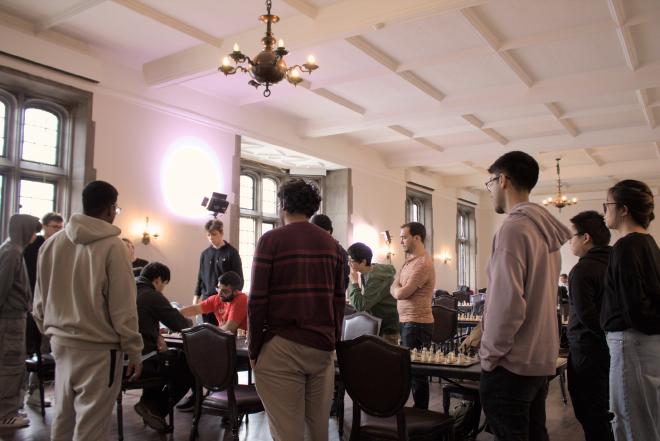 |
|---|
| Here during time scrambles there can be many spectators watching. It’s imperative that the Arbiter is nearby, watching the clock, spectators, and players to ensure that anything that happens is dealt with quickly. (Photo by Deepanshi Matai) |
Objective Decision Making #
At its core, the role of a National Arbiter is to uphold and apply the FIDE Laws of Chess impartially. When infractions occur—such as a player attempting to arrange a draw in front of the Arbiter—the correct course of action should be clear. The Laws must be enforced consistently, regardless of personal familiarity or a player’s status. Favoritism, even toward top players, has no place in fair arbitration.
Consider the recent “jeans controversy.” The Arbiter’s role is not to question the rule, but to enforce it as written. That said, professionalism and tact are essential. Arbiters should aim to maintain a positive atmosphere where all parties—players, spectators, organizers, and sponsors—feel respected and enjoy the event experience.
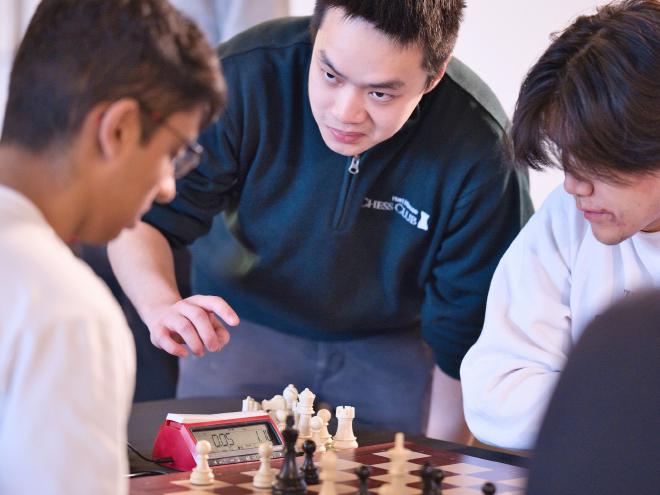 |
|---|
| Here I apply a time penalty during the 2025 UToronto vs UWaterloo match. (Photo by John Upper/CFC Newsletter) |
My Requirements of Becoming a FIDE Arbiter #
One of the main benefits of becoming a FIDE Arbiter is that now you can run Norm tournaments and that you can also hand out norms for FIDE Arbiters. Therefore, there is added responsibility for those who become FIDE Arbiters indeed deserve this title.
Understanding of FIDE Norms and FIDE ratings #
Many players want to know what their ratings will be after the tournament. A FIDE arbiter should have an understanding of what the FIDE regulations of chess are about and how the rating system works. In addition, an Arbiter has the ability to hand out FIDE norms such as for International Master and Grandmaster. We must be ready to provide the answer of whether a player has achieved the requirements of the norms so that they can celebrate one of their most important achievements of their lives.
Thorough Understanding of Claims #
I expect that most National Arbiters don’t have as much experience with claims. If a NA isn’t that familiar, ideally a more experienced arbiter will step up (like the Chief Arbiter) to assist. I expect a FIDE arbiter to know the proper way of handling situations when someone stops the clock and calls the arbiter. There’s an expectation that we can adjudicate an illegal move on the spot (with correct delivery of instructions to both players), conduct claims for 3-fold and 50-move rules, and to understand both the 5-fold and 75-move rules.
Understanding of Anti-Cheating Decisions #
For someone to become a FIDE Arbiter in 2025 it’s imperative that anti-cheating is taken very seriously. We have to ensure that players feel like everyone is playing on the same playing ground. This includes how to conduct a proper anti-cheating investigation, how to remove chances of cheating (like washroom checks), and prevention like removing spectator access for some areas, and enforcing move-delays for electronic boards.
Use of Electronic Boards and Digital Equipment #
With today’s digital age, I believe a FIDE Arbiter should have at least some understanding of how to use electronic boards such as Digital Game Technology (DGT) systems. This is because more and more boards will be digitalized in coming years and the ability to use the systems for validating correct game play will only get larger. It goes without saying that a FIDE Arbiter should have a very solid understanding of digital clocks, conducting clock checks, and implementing penalties.
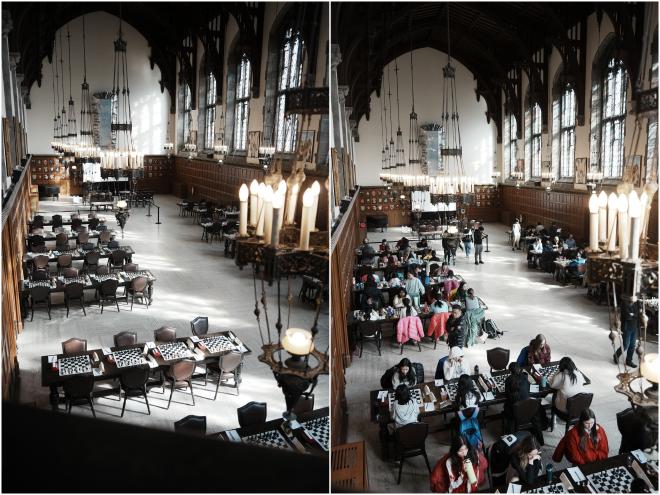 |
|---|
| As arbiters we are tasked with ensuring that the playing hall is ready for play before the tournament begins. Here is the before and during photos during the 2024 Canadian National Championships. (Photo by Yankee Zhu) |
Setting Up the Playing Hall #
Although this one is a bit related more to Organizers, the Arbiter team is in charge of ensuring the playing hall meets the standards of play. An Arbiter when involved in the build-up to the tournament should try to minimize as many possible problems as possible. This often comes from finding the right venue with lighting, room design, table lengths, washroom locations, playing areas, playing venues, and smoking/rest areas. Are spectators going to be allowed and where? At the very least, all FIDE arbiters should know the rules of the tournament and the logistics of the tournament so that they know what is happening and when.
Working with the Arbiter Team #
At any tournament, it’s never just about one arbiter. If it is, it’s hopefully a small tournament like a Round Robin or a small swiss with less than 20 players. Otherwise, it’s likely understaffed. At Hart House we try to never get into a situation like this because the quality of tournaments degrades.
When we have more than one person almost always there’s an understanding that FIDE Arbiters are more experienced than National Arbiters. In my opinion, FIDE Arbiters should try to help National Arbiters improve by pointing out what they can do better. National Arbiters should be receptive to the feedback so that everyone can benefit from better chess arbiters in the ecosystem.
At the same time, FIDE Arbiters should also be receptive to feedback from peers especially their senior arbiters who want to help as well (eg. International Arbiters). We want to build a system that benefits the development of arbiters of all levels.
 |
|---|
| Here I am work through different swiss pairings situations with a deputy arbiter. (Photo by Jay Bhadreshwara) |
Closing Thoughts #
I hope that more people get involved in the chess arbiter world. The more there are, the better tournaments can become and the higher the quality increases as well. In the same way that FIFA have Referees and the ATP has Umpires, we need high quality arbiters of chess to take it to the next level.
I highly suggest reaching out to different local clubs to see what they offer and resources they can provide. For instance, when I was at the Hart House Chess Club, we organized two FIDE Arbiters Seminars within 2-years and had 7-students pass the FIDE Arbiter Seminar, and 10-students become National Arbiters. This will have a long-lasting impact on Canadian Chess in the years to come. For instance, at this year’s 2025 Canadian National Championship, there will be three Hart House Chess Club trained arbiters (out of a team of about 7).
In the coming years, I’m quite certain that there will be changes to the administration of arbiter titles in Canada and possibly across the world. All in all though, I hope that these will only improve the level of tournaments that are delivered in Canada.
 |
|---|
| We see that one of the roles of an Arbiter is to enforce playing areas and ensure spectators are free of distractions. In this case I am enforcing spectator access to the top boards through the use of stanchions. I’m also proactively monitoring my sections and the boards I am assigned so that we can enforce the laws of chess if incidents occur. (Photo by Derek Ma) |